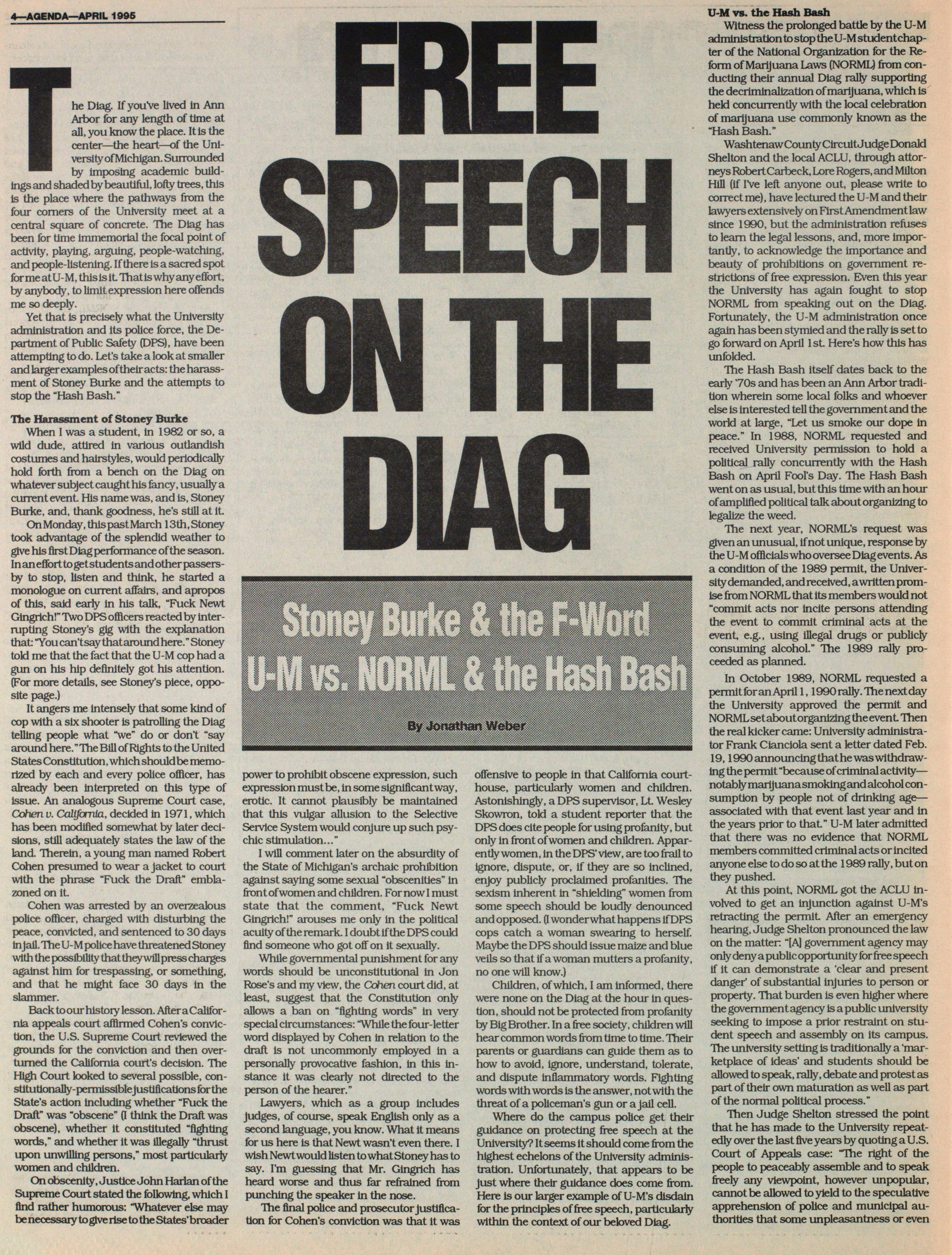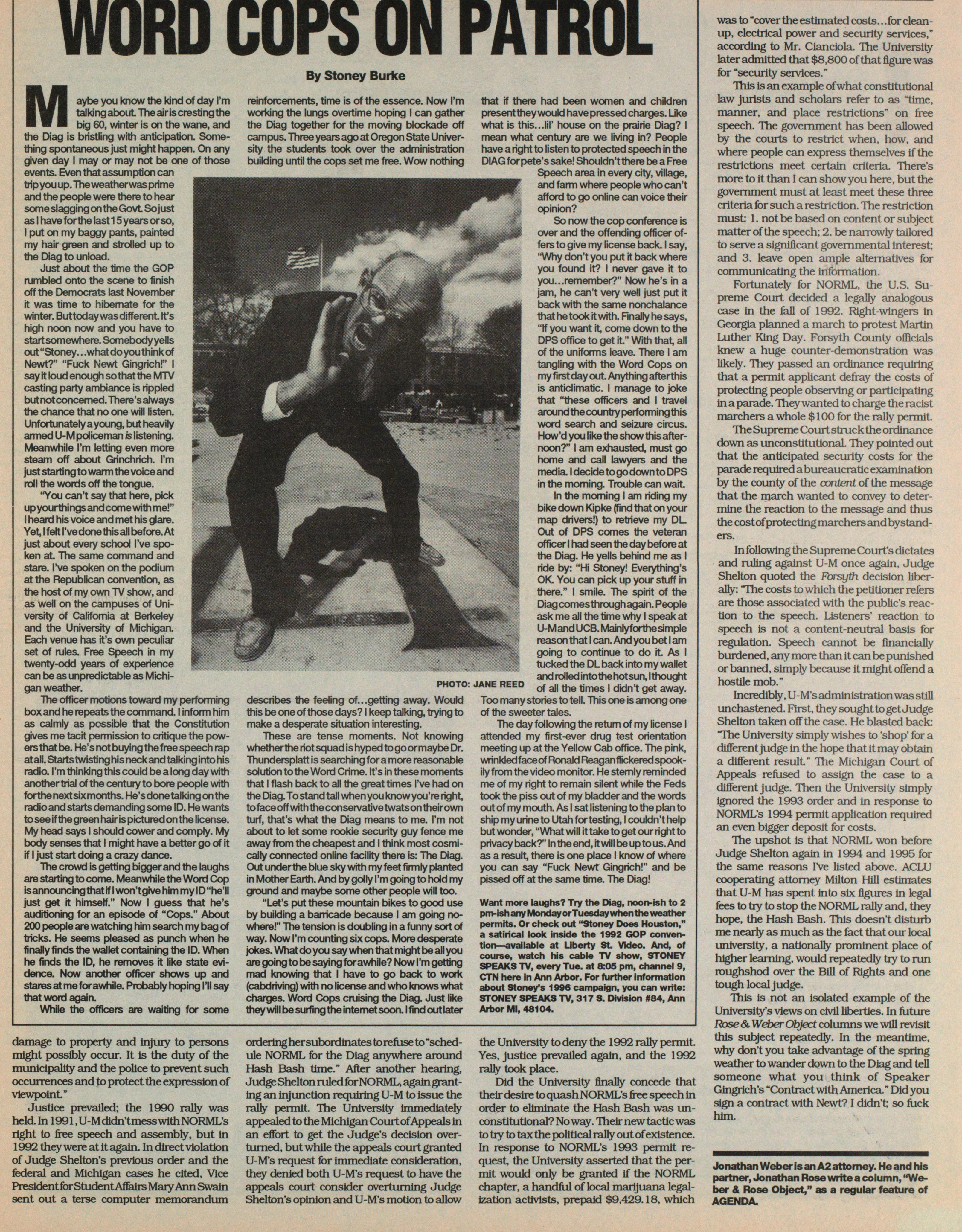Free Speech On The Diag


The Diag. If you've lived in Ann Arbor for any length of time at all, you know the place. It is the center-the heart-of the University of Michigan. Surrounded by imposing academic buildings and shaded by beautiful, lofty trees, this is the place where the pathways from the four corners of the University meet at a central square of concrete. The Diag has been for time immemorial the focal point of activity, playing, arguing, people-watching, and people-listening. If there is a sacred spot for me at U-M,this is it. That is why any effort, by anybody, to limit expression here offends me so deeply.
Yet that is precisely what the University administration and its police force, the Department of Public Safety (DPS), have been attempting to do. Let's take a look at smaller and larger examples of their acts: the harassment of Stoney Burke and the attempts to stop the "Hash Bash."
The Harassment of Stoney Burke
When I was a student, in 1982 or so, a wild dude, attired in various outlandish costumes and hairstyles, would periodically hold forth from a bench on the Diag on whatever subject caught his fancy, usually a current event. His name was, and is, Stoney Burke, and, thank goodness, he's still at it.
On Monday, this past March 13th, Stoney took advantage of the splendid weather to give his first Diag performance of the season. In an effort to get students and other passerby to stop, listen and think, he started a monologue on current affairs, and apropos of this, said early in his talk, "Fuck Newt Gingrich!" Two DPS officers reacted by interrupting Stoney's gig with the explanation that: "You can't say that around here." Stoney told me that the fact that the U-M cop had a gun on his hip definitely got his attention. (For more details, see Stoney's piece, opposite page.)
It angers me intensely that some kind of cop with a six shooter is patrolling the Diag telling people what "we" do or don't "say around here." The Bill of Rights to the United States Constitution, which should be memorized by each and every police officer, has already been interpreted on this type of issue. An analogous Supreme Court case, Cohen v California, decided in 1971, which has been modified somewhat by later decisions, still adequately states the law of the land. Therein, a young man named Robert Cohen presumed to wear a jacket to court with the phrase "Fuck the Draft" emblazoned on it.
Cohen was arrested by an overzealous police officer, charged with disturbing the peace, convicted, and sentenced to 30 days in jail. The U-M police have threatened Stoney with the possibility that they will press charges against him for trespassing, or something, and that he might face 30 days in the slammer.
Back to out history lesson. After a California appeals court affirmed Cohen's conviction, the U.S. Supreme Court reviewed the grounds for the conviction and then overturned the California court's decision. The High Court looked to several possible, constitutionally-permissible justifications for the State's action including whether "Fuck the Draft" was "obscene" (I think the Draft was obscene), whether it constituted "fighting words," and whether it was illegally "thrust upon unwilling persons," most particularly women and children.
On obscenity, Justice John Harlan of the Supreme Court stated the following, which I find rather humorous: "Whatever else may be necessary to give rise to the States' broader power to prohibit obscene expression, such expression must be, in some significant way, erotic. It cannot plausibly be maintained that this vulgar allusion to the Selective Service System would conjure up such psychic stimulation..."
I will comment later on the absurdity of the State of Michigan's archaic prohibition against saying some sexual "obscenities" in front of women and children. For now I must state that the comment, "Fuck Newt Gingrich!" arouses me only in the political acuity of the remark. I doubt if the DPS could find someone who got off on it sexually.
While government punishment for any words should be unconstitutional in Jon Rose's and my view, the Cohen court did, at least, suggest that the Constitution only allows a ban on "fighting words" in very special circumstances:"While the four-letter word displayed by Cohen in relation to the draft is not uncommonly employed in a personally provocative fashion, in this instance it was clearly not directed to the person of the hearer."
Lawyers, which as a group includes judges, of course, speak English only as a second language, you know. What it means for us here is that Newt wasn't even there. I wish Newt would listen to what Stoney has to say. I'm guessing that Mr. Gingrich has heard worse and thus far refrained from punching the speaker in the nose.
The final police and prosecutor justification for Cohen's conviction was that it was offensive to people in that California courthouse, particularly women and children. Astonishingly, a DPS supervisor, Lt. Wesley Skowron, told a student reporter that the DPS does cite people for using profanity, but only in front of women and children. Apparently women, in DPS' view, are too frail to ignore, dispute, or, if they are so inclined, enjoy publicly proclaimed profanities. The sexism inherent in "shielding" women from some speech should be loudly denounced and opposed. (I wonder what happens if DPS cops catch a woman swearing to herself. Maybe the DPS should issue maize and blue veils so that if a woman mutters a profanity, no one will know.)
Children, of which, I am informed, there were none on the Diag at the hour in question, should not be protected from profanity by Big Brother. In a free society, children will hear common words from time to time. Their parents or guardians can guide them as to how to avoid, ignore, understand, tolerate, and dispute inflammatory words. Fighting words with words is the answer, not with the threat of a policeman's gun or a jail cell.
Where do the campus police get their guidance on protecting free speech at the University? It seems it should come from the highest echelons of the University administration. Unfortunately, that appears to be just where their guidance does come from. Here is our larger example of U-M's disdain for the principles of free speech, particularly within the context of our beloved Diag.
U-M VS. the Hash Bash
Witness the prolonged battle by the U-M administration to stop the U-M student chapter of the National Organization for the Reform of Marijuana Laws (NORML) from conducting their annual Diag rally supporting the decriminalization of marijuana, which is held concurrently with the local celebration of marijuana use commonly known as the "Hash Bash."
Washtenaw County Circuit Judge Donald Shelton and the local ACLU, through attorneys Robert Carbeck, Lore Rogers and Milton Hill (if I've left anyone out, please write to correct me), have lectured the U-M and their lawyers extensively on First Amendment law since 1990, but the administration refuses to learn the legal lessons, and more importantly, to acknowledge the importance and beauty of prohibitions on government restrictions of free expression. Even this year the University has again fought to stop NORML from speaking out on the Diag. Fortunately, the U-M administration once again has been stymied and the rally is set to go forward on April 1st. Here's how this has unfolded.
The Hash Bash itself dates back to the early '70s and has been an Ann Arbor tradition wherein some local folds and whoever else is interested tell the government and the world at large, "Let us smoke our dope in peace." In 1988, NORML requested and received University permission to hold a political rally concurrently with the Hash Bash on April Fool's Day. The Hash Bash went on as usual, but this time with an hour of amplified political talk about organizing to legalize the weed.
The next year, NORML's request was given an unusual, if not unique, response by the U-M officials who oversee Diag events. As a condition of the 1989 permit, the University demanded, and received, a written promise from NORML that its members would not "commit acts nor incite criminal acts at the event, e.g., using illegal drugs or publicly consuming alcohol." The 1989 rally proceeded as planned.
In October 1989, NORML requested a permit for an April 1, 1990 rally. The next day the University approved the permit and NORML set about organizing the event. Then the real kicker came: University administrator Frank Cianciola sent a letter dated Feb. 19 1990 announcing that he was withdrawing the permit "because of criminal activity-notably marijuana smoking and alcohol consumption by people not of drinking age-associated with that event last year and in the years prior to that." U-M later admitted that there was no evidence that NORML members committed criminal acts or incited anyone else to do so at the 1989 rally, but on they pushed.
At this point, NORML got the ACLU involved to get an injunction against U-M's retracting the permit. After an emergency hearing, Judge Shelton pronounced the law on the matter: "[A] government agency may only deny a public opportunity for free speech if it can demonstrate a clear and present danger of the substantial injuries to person or property. That burden is even higher where the government agency is a public university seeking to impose a prior restraint on student speech and assembly on its campus. The university setting is traditionally a marketplace of ideas and students should be allowed to speak, rally, debate and protest as part of their own maturation as well as part of the normal political process. "
The Judge Shelton stressed the point that he has made to the University repeatedly over the last five years by quoting a U.S Court of Appeals case: "The right of the people to peaceably assemble and to speak freely any viewpoint, however unpopular, cannot be allowed to yield to the speculative apprehension of police and municipal authorities that some unpleasantness or even